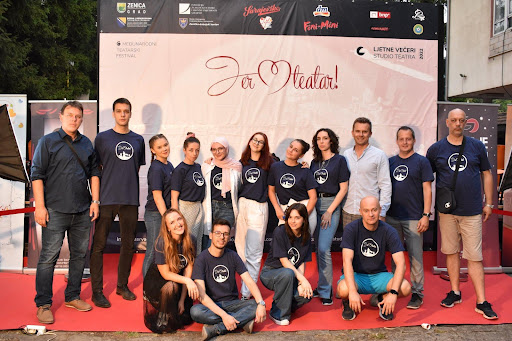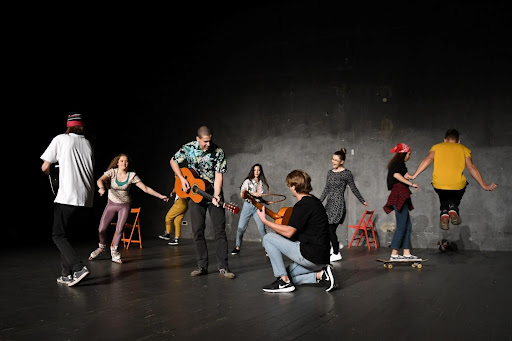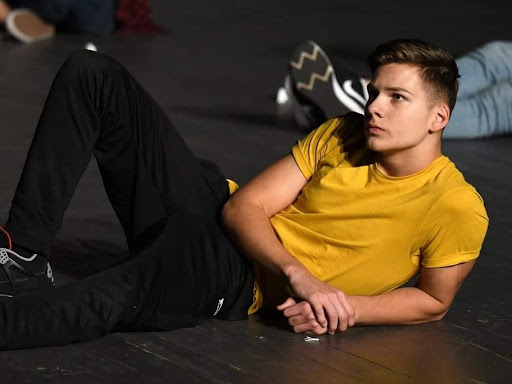
Studio Theater, a theater group from Zenica, has been introducing and promoting theatrical art, and art in general, among young people for the past six years. They are raising awareness about the importance of the performing arts through various projects, including those involving young people from other communities in Bosnia and Herzegovina.
Studio Theater was born out of the ambitions and vision of actor Nusmir Muharemović, specifically to establish an open-air festival called “Summer Evenings of Studio Theater.” With this festival, they sought to provide Zenica and its citizens with the opportunity to see and enjoy performances by professional theater groups.
In organizing the first “Summer Evenings of Studio Theater” festival, Muharemović says he encountered numerous challenges. Apart from his friend Mirza Begović, no one believed in the festival’s potential. “What’s more, most of them told me it was prostitution of the theater. However, I continued to believe in the idea, and it continues to thrive to this day,” Muharemović emphasized, noting that the lack of faith in the festival idea added to the wind at his back.

The first festival, as Muharemović explained, was organized without any financial assistance. He made all the necessary contacts himself – for everything from the stage equipment to the chairs for the audience – and all of the actors came and performed for free.
“The festival lasted for five nights, and each night, about 150 people attended the performances. To me, that’s a measure of success,” added Muharemović.
In the years that followed, more and more people started believing in the idea of the festival, and young people became increasingly involved in spreading the vision of this organization through various projects. Currently, Studio Theater has five plays in its repertoire, which are: the comedy “State Thief,” the duodrama “Death and the Dervish,” the musical-poetic feature “Stay Here,” the children’s play “The Boy who Doesn’t Want to Grow Up,” and the youth production “Youth in the Time of Corona.”
Future Actors
Sven Zrnić, a graduate of Zenica’s Medical High School, witnesses first-hand how Studio Theater brings the performing arts closer to young people and thus nurtures actors-to-be. He is one of many in whom Studio Theater has instilled a love for acting, influencing their decision to pursue acting as a professional career.
“My plan is to enroll in an acting academy, and Studio Theater is one of the main reasons for this. Their approach and methods of operation ‘made me’ fall in love with this vocation. Since the project “Youth in the Time of Corona,” my passion for this work has begun to grow enormously. I’m extremely grateful to Studio Theater for everything they’ve done for me as an individual as well as for the community, by promoting culture and art,” said Sven.
He explained that his collaboration with Studio Theater began three years ago with the play “Youth in the Time of Corona,” which was a beautiful experience that he says he will cherish for the rest of his life. After that, he worked on the project “Theater on the Square.”

“I was deeply impressed by Studio Theater because each project carries an exceptionally beautiful message and is a wonderful chance for people from Bosnia and Herzegovina and across Europe to socialize,” said Sven. He highlighted his participation in the five-day workshop “Reflection in the Water,” where met artists from all over Europe.
Sven places particular emphasis on the fact that Studio Theater promotes culture and art in places where it is less prominent and provides young people with the opportunity to showcase their drive and talent.
Bosnian and European Tours
For the play “Youth in the Time of Corona,” the founder of Studio Theater explained that they spoke with young people about the challenges they were facing during the COVID-19 pandemic. Based on their stories, they created a play, directed by actress Lana Delić from the Bosnian National Theater.
“The stories of the actors in this play are connected to the stories of all young people in Bosnia and Herzegovina. The play addresses an issue that they have in common, and which isn’t determined by nationality, religion, or economic status. The play was performed in Zenica, Breza, Stolac, and Prijedor,” Muharemović elaborated.
Regarding the “Theater on the Square” project, he described it as a combination of acting and performative play, music, and dance, which allows young actors to highlight the pressing issues faced by youth in Bosnia and Herzegovina, as well as the problems in Bosnian-Herzegovinian society. Young people from Zenica, Busovača, Novi Travnik, and Gornji Vakuf-Uskoplje participated in the project.
“The performances were held in these four cities and gathered thousands of spectators,” added Muharemović.
The play “Reflection in the Water” seeks to erase formal boundaries between learning and artistic creation, striving to make theatrical creation and practice the heart of lifelong, cross-sectoral, and multidisciplinary learning. This approach centers on the dynamics of skill acquisition, experience, knowledge, and creation. The first part of the project is based on a series of workshops, encompassing theater, music, literature, and similar domains. These workshops are designed to explore cultural heritage, facilitate the exchange of experiences among participants from three countries, and create a methodology that will serve as a foundation for a series of activities that will be carried out over the next two years.
One of the activities, according to Muharemović, is the production of a play featuring contributions from authors, artists, actors, musicians, performers, dancers, along with amateurs and young people involved in the project.
“The play will have its European tour, connecting Vichy, Sigmaringen, Vienna, Cluj, and Timisoara, as well as Sarajevo, Zenica, Brescia, and Oulx,” remarked Muharemović.
Studio Theater’s other projects include “Paths of Heroes,” the docudrama film “Without a Voice,” “The Theater of the Future,” and many more.
This year, Studio Theater held the seventh edition of the “Summer Evenings of Studio Theater” festival. When asked about the secret of their success, Muharemović emphasized that it lies in their loyal audience, who follow and support them, as well as in the organization of Studio Theater itself.







Shejla Piric
I’m reaching out to see if anyone has any connections to see if our folk group could get our hands on a short theatrical play that we could teach our little 6-8 year old to perform about the Bosnian culture . Please if you can connect me with anyone I’d greatly appreciate it.